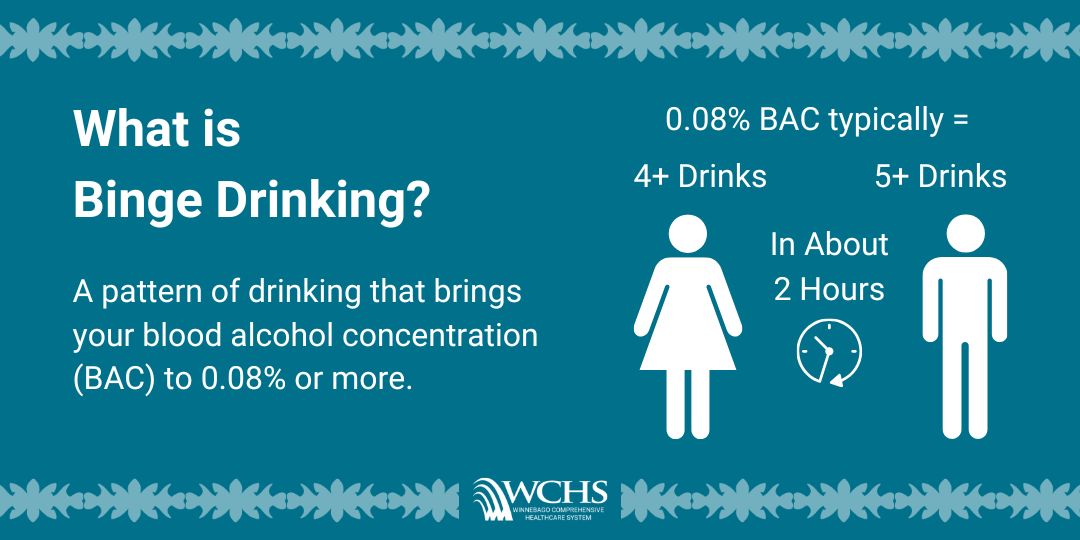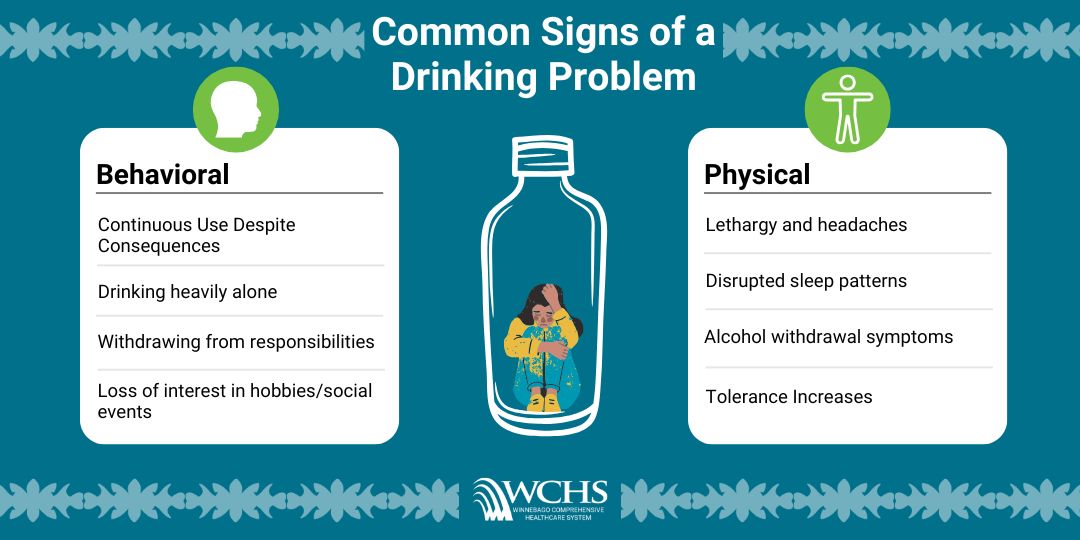Is My Drinking a Problem?
October 16, 2024
Recognizing a drinking problem in yourself or others can be challenging. Afterall, drinking is socially acceptable, and in cases, encouraged by your peers or relatives. It's very easy to excuse your heavy drinking with social excuses. You may say you only drink socially, but if you're social 5 out of 7 days in the week this could indicate a larger issue. The next time your friends ask you to hang out, try your best to remain sober and see how you feel afterwards. You may be surprised to find that waking up in the morning without a hangover is worth the effort of being different than your friends.
7.1% of Native Americans have an alcohol use disorder according to the 2018 National Survey on Drug Use and Health. Our community is more susceptible to alcohol abuse because of generational trauma, violence, poverty, discrimination, and higher levels of unemployment. Even those who don't have an alcohol use disorder may be abusing alcohol in other ways. The same survey showed that nearly 25% of Native Americans reported binge drinking in the past month.

Any amount of drinking can cause harm, but binge drinking increases the risk of acute harm, seen as blackouts or overdoses. Data suggests that alcohol effects virtually all tissues in the body. One episode of binge drinking can compromise function of the immune system. Overtime the misuse of alcohol contributes to liver issues, chronic diseases, and several types of cancer.
These alcohol misuse health effects are very scary and intimidating. It is best to intervene early or seek assistance before things escalate. It's never too late to stop the misuse and ask for assistance.
I have a drinking problem if...
Alcohol has the ability to control one's life and relinquish all hope that you could ever possibly recover. If you find that you're suffering from negative consequences when drinking, such as health problems, relationship issues, or legal trouble, then you may want to consider cutting back or sobering up. Alcohol can be very hard to stop using, even when you realize the negative consequences are ruining your life. Continuous use despite consequences may mean you have a drinking problem.
You may find yourself needing more and more alcohol to feel the same effects you're used to when drinking. This indicates that your tolerance is increased. This can be an early sign of alcohol use disorder, and it may be time to cut back. For someone who is not addicted to alcohol they are able to cut off their use of alcohol easily with no hesitations or side effects whereas someone with alcohol problems can't manage this easily. If you find yourself attempting to become sober, but have difficulty saying no to alcohol this demonstrates loss of control.
Life can be overwhelmingly filled with responsibilities, to-dos, and work. Managing life can be difficult for the average person, and adding alcohol misuse into the mix makes life even harder. If you find yourself neglecting daily responsibilities because of alcohol, this is often cause for concern. Experiencing hangovers is common when drinking heavily the night before. It becomes more serious when one experiences physical and mental discomfort while not consuming alcohol. This would be a form of withdrawal. Physical symptoms of withdrawal can be seen as tremors, anxiety, and or irritation.

Recognizing Physical Symptoms
Immediate Alcohol Effects:
Slurred speech, shaky gait, or impaired coordination.
Long-term Use Effects:
Weight loss, malnutrition, or a disheveled look.
Steps to Sobriety
Help is only one call away. Remember that there are people who care about you and your life is very much worth recovering for. WCHS is set up to help you start your sobriety journey, see your options here.
Step 1: Detox
The first thing to know is that alcohol withdrawal can be dangerous, and in severe cases, deadly depending on the severity of alcohol addiction. The safest thing to do is seek medical help to withdraw. Medical detox facilities can help you manage the potential withdrawal symptoms in a safe environment.
Step 2: Treatment
Rehabilitation and treatment are recommended to start off your sobriety journey on the right foot. Rehabilitation can be in-patient or out-patient depending on your needs. In-patient rehab is when you stay full time at a facility until you recover, and outpatient is when you seek care during the day but still go home at night to live.
Inpatient rehab, also called residential treatment, has many advantages over outpatient. Advantages include safety of treatment and detoxification and a higher success rate of remaining sober. Having medical professionals and ways of easing ones detox is a major comfort to those dealing with the symptoms of detox. When in an inpatient rehab success rates are higher due to length of time involved, less temptations, and more structured support systems.
Outpatient rehabs allow you to detox while still being able to complete daily life responsibilities like work, school, or family events. This process will mostly likely include medication assisted detox, alcohol counseling sessions, and various therapies and support groups.
Step 3: Aftercare Support
Once your treatment is completed and you're on two feet again, you can start to think about the long-term aspects of care in your life. Many people who have recovered find that attending 12-Step meetings or other recovery meetings is the best way to remain on the path of soberness. Through a program such as AA you will find support from sponsors, peers, and relatives who relate to what you're experiencing and can offer valuable advice for your future. Learn More about WCHS's recovery meetings.
There are various versions of therapies that can aid in one's sobriety journey. Talk therapies can help you sort through the emotional processes behind your actions and how you react to certain things. While you may be more comfortable with connecting to traditional healing approaches like powwows and drum circles that encourage bonding with others and opening yourself up to reflection.
Resources
988 Suicide & Crisis Lifeline
WCHS Recovery Program
Winnebago Recovery Meetings
Sources:
Hanley Foundation. (2024, July 11). Am I an alcoholic? 5 warning signs. Hanley Foundation. https://hanleyfoundation.org/addiction-treatment/am-i-an-alcoholic-5-warning-signs/
11 warning signs of an alcohol problem. Alcohol.org. (2022, October 25). https://alcohol.org/faq/drinking-problem-signs/